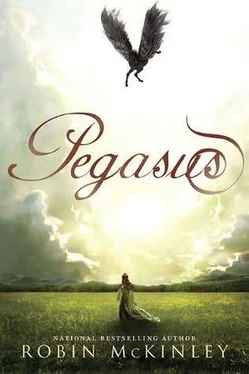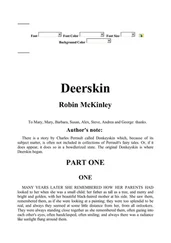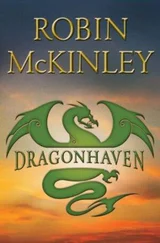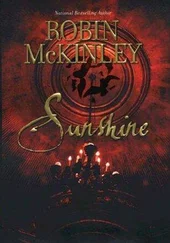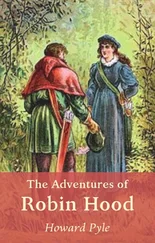Among the stone pegasi there were other things: trees and flowers and climbing vines, leaves and branches and blooms, saplings and bushes and forests—rabbits, deer, foxes, fornols, badgers, bears, birds—many, many birds, from the tiniest wrens to great raptors with wingspans nearly as great as the pegasi’s own—spiders and beetles and butterflies and bees. There was a stone stream near where Sylvi stood with several pegasi prancing in it: every drop of water was clearly and lovingly detailed.
And humans. Sylvi had been turning slowly round as if looking for something—and yet she did not want to see humans—see them here, surrounded by pegasi, to be forced to look again at the coarseness and gracelessness of what she was herself. She wrapped her gawky arms around her clumsy body and hunched her shoulders.
Ebon saw where she was looking and said, Hey, don’t worry. They’re only stone.
We’re so ugly, said Sylvi miserably.
Ugly? There was a pause, as if Ebon were considering the matter; he was certainly looking first at the carved humans and then at Sylvi, and then back. I don’t think so. I like the way it’s all up and down with you, and no sideways. It’s very—direct. Like you humans are. Although you’re better-looking than that lot. He looked hard at Sylvi, seemed to make up his mind about something, and went on: When Dad first told me I was going to have to be your pegasus, I used to come here and stare at these guys. I’d only seen live humans a few times, when a crowd of us went to your palace for some big rite or festival or other, after I was big enough to fly that far. And then us kids were always kept well back and never went to the banquets.
I never saw you, said Sylvi. I’d remember, black is so unusual. I can hardly remember seeing any young pegasi, unless it was one of you being bound to one of us.
Yes—well—you do have to be nearly grown to fly that far. Ebon was silent a moment, and then went on: You—you humans—saved our lives—and you go on saving our lives. The taralians and their friends would be all over us in a few generations if you left. And we’d just sit here and let them, because we wouldn’t leave the Caves, and without the llyri grass we’d stop flying within a generation or two. We’d stop flying but our legs still wouldn’t be tough enough to run like deer and horses run. Our shamans say the grass grows out of the stone that the Caves are made of, that’s what makes our wings strong enough to carry us. Two thousand years ago the taralians found us—that’s what the stories say—we could have run away, but we couldn’t’ve either, right?
Taralians and norindours and ladons don’t like our mountains much and don’t like our Caves at all, but we couldn’t stay here all the time. Did you know that we used to raise llyri grass where your palace now sits? That field of it your gardeners keep for us has been growing there for probably four thousand years. Even the barn where you keep it after harvest is where our old winter pavilion used to be. A roc knocked it down a century or two before you came.... That’s pretty much when we pulled out of the lowlands.
Our shamans told us we’d get rescued at the last minute. And we did—you came. But something went wrong....
Sylvi turned and walked toward the wall where the carved stone humans stood. It took her a moment to realise why the scene looked familiar. It was where she had just been, what she had just seen, although she was seeing it now from a different angle, as if the army camp was behind her, and the way she had come with the hundreds of pegasi in front of her. The humans were now on her left and the pegasi on her right. Even now that she could not hear them speak, the strangeness of the humans’ armour drew her attention; even now that they were inanimate images on a wall she could see the tension of them, the set concentration of their faces.
And she could still pick out the two magicians although the baton was not visible. One of them looked as the other humans looked, fixed on the matter at hand but worried about its outcome. The other was the one who reminded her of Fthoom.
She knew he was not Fthoom; this man did not even look like him. But that sense of power, of power held for hidden purposes, held in a way meant to be intimidating so that the wielder of it can better judge the strength of any opposition—that was Fthoom. That inward look, the look of a miser always preoccupied with his private treasure, of the greatness of what was his and his alone, and of how to make it greater yet—that was Fthoom. She found herself thinking that this man even moved like Fthoom—except that she was looking at a sculptured wall. Perhaps the candlelight slid over him differently than it glinted over the others.
I don’t like this one, she said.
I don’t like him either. He’s ugly, if you like.
Ugly, she said. Why did you come here? When you knew you had to be my pegasus.
The skin over Ebon’s shoulders shivered and he nodded his head once quickly, a sign of embarrassment. Well. These are the only humans in the Caves. If I wanted to look at humans, these were it. That was a long time ago, okay? I was a lot younger, and I hadn’t met you.
These are the only humans in the Caves? I’m surprised there are any, she thought. Why these?
Ebon looked at her in surprise—tall neck drawn up even straighter (how regal he looks, she thought), ears stiffly pricked, just one wrinkle across his nose. That’s the signing of the treaty, he said. I thought you’d recognised it. That’s your king Balsin, and our Fralialal. And that’s Dorogin, the ugly one, and Gandam.
The signing of the treaty.
Ssshasssha. History and . . . recollection.
The motionless stone picture was taking place just after she had watched the living scene: the two humans were still holding the treaty paper flat against the table, but a pegasus—it would be the pegasus king—was holding one wing, with the first three primaries curiously spread, just above its surface. These were astonishingly artfully done, for the shadows fell in such a way as to show, now that she was looking for this, the inked tips of those feathers. As the candlelight flickered she felt she saw him draw his feather-tips across the surface of the paper in the quick, graceful, triple stroke she had seen replicated on so many documents, so many commemorative plaques and paintings at the palace. She thought of the mural in the Great Hall where, when she was younger, she had thought she could hear Fralialal stepping down from the wall onto the floor. That Fralialal was bigger, grander—more human. This one, here, on the wall of the Caves, this one was a true pegasus: smaller, finer, graceful as candlelight . . . exotic. Inexplicable. Unknowable.
The signing of the treaty.
She had just been standing on eight-hundred-year-old grass, smelling the smoke of the eight-hundred-year-old war that had given her people and Ebon’s their Alliance. She had seen the treaty itself unrolled, when it was only a new piece of fine paper with some writing on it—she had seen it before it was signed, before it was the treaty, before it hung on the wall of the Great Hall, before Balsin’s signature on it had become the reigning monarch’s mark.
She had met Dorogin’s eyes.
And Dorogin looked like Fthoom. In the mural at the palace, none of the human faces stood out: they were just humans. Only the pegasus king and the treaty itself had any reality.
No—she would not think of it any more. She would not think of the fact that she had been there, the fact that something about the Caves had made her imagine that she had been there. She would not think of it. But she could—she would—she must think about Dorogin and Fthoom.
Читать дальше
